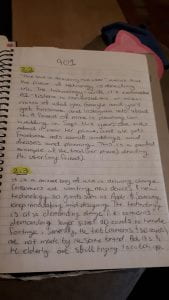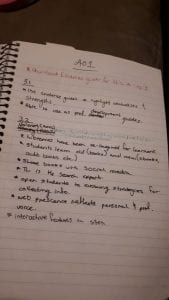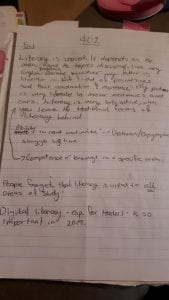When it comes to this reflective practice blog post, I feel that I will fall short and not be truly effective. I have struggled with being reflective publicly during this semester, and therefore have not posted much in the way of weekly forums or blog posts. This is something that I hope to improve on as I continue my study.
Information Literacy is defined by the Chartered Institute of Library and Information Professionals as “Information literacy is the ability to think critically and make balanced judgements about any information we find and use. It empowers us as citizens to reach and express informed views and to engage fully with society” (2016). To generalise it, this means that we look at the information in front of us and decide not just how we should use it but how we can do so with the wider community (whether that be the workplace, school or family) in mind. One thing that needs to be kept in mind, is how students access the information. Those with dyslexia or dysgraphia, in particular, can struggle to comprehend the information adequately due to struggles with their level of literacy comprehension. A Teacher Librarian can assist the students by working with the subject teachers to locate resources that are literacy level appropriate, subject appropriate and engaging for the students. They can also work with teachers to help students to scaffold their learning. This leads one to different Information Literacy Models.
It should be made clear that Information Literacy Models do not refer to programs that concentrate on merely teaching the Information Literacy skills. The Models are meant to take the skills to the next level and produce high quality work that show creativity and thought.
There are many different Information Literacy Models, however the New South Wales Information Search Process (NSW ISP) and Guided Inquiry Design Process (GIDP) are the ones I’ll be commenting on here. NSW ISP utilises the different stages of inquiry learning; “defining, locating, selecting, organising, presenting and assessing” (New South Wales Department of Education, 2019), in order to help students increase their Information Literacy skills to a high level. Students are encouraged to move back and forth between stages as their research and inquiry progress. The GIDP, in comparison, has the stages of “open, immerse, explore, identify, gather, create, share and evaluate” (Caspari, Kuhlthau & Maniotes, 2019). This too, helps students to bring their Information Literacy skills to a high level; however, I feel that it (GIDP) opens students to the idea of it in a more gentle manner. I feel that the GIDP allows students more freedom to begin their inquiry by immersing themselves in the topic before identifying what they require in the way of research. NSW ISP, on the other hand, seems to “throw” the students in the deep end by asking of them in the first stages of the process what they require in the way of information.
The Teacher Librarian role within Inquiry learning is varied. They are a support person for the teacher and for the student when it comes to research and resource acquisition. They can help both parties gain access to areas that they otherwise could not. They can help scaffold learning and make the Inquiry process more accessible for students that have learning disabilities or other factors that impact their ability to fully participate in the Inquiry learning.
I have learnt a lot over this semester in ETL401 and while my reflective practice my not necessarily reflect it; I hope that I am able to somewhat convey my understanding of the subjects content.
References
Caspari, A., Kuhlthau, C., & Maniotes, L. (2019). GID – Guided Inquiry Design. Retrieved from https://guidedinquirydesign.com/gid/
CILIP Information Literacy Group. (2016). Definitions & models – Information Literacy Website. Retrieved from https://infolit.org.uk/definitions-models/
New South Wales Department of Education. (2019) Information Search – North Sydney Public School. Retrieved from https://nthsyddem-p.schools.nsw.gov.au/learning-at-our-school/library/information-process.html





